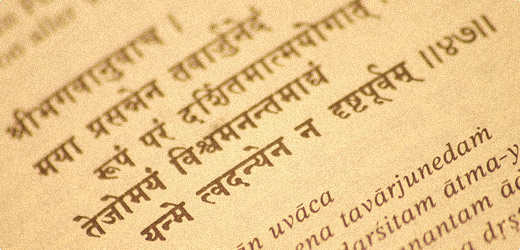 “Who am I?” Maybe you’ve never even asked yourself this question. You might think you already know who you are. Unfortunately, however, it’s likely that you don’t know who you are at all. And if you don’t know your real identity, you’re in trouble. You’ll spend your life in a kind of dream state—you’ll falsely identify yourself as something or someone you aren’t. Then, on the basis of this false identification, you’ll determine the goals of your life and the purpose of your existence. You use these goals to gauge whether you are making “progress” in life, whether you are a “success.” And you are aided and abetted in this delusion by a complex network of relationships with other dreamers. Of course, at death (and sometimes before), the whole thing turns into a nightmare.
“Who am I?” Maybe you’ve never even asked yourself this question. You might think you already know who you are. Unfortunately, however, it’s likely that you don’t know who you are at all. And if you don’t know your real identity, you’re in trouble. You’ll spend your life in a kind of dream state—you’ll falsely identify yourself as something or someone you aren’t. Then, on the basis of this false identification, you’ll determine the goals of your life and the purpose of your existence. You use these goals to gauge whether you are making “progress” in life, whether you are a “success.” And you are aided and abetted in this delusion by a complex network of relationships with other dreamers. Of course, at death (and sometimes before), the whole thing turns into a nightmare.
So knowing who you are is a very practical necessity. The question “Who am I?” is not a philosophical football meant to be kicked around coffeehouses by pseudo-intellectuals. It’s a real-life question. Nothing is more important and more relevant than to know who you are.
~ Jagad Guru Chris Butler (Siddhaswarupananda Paramahamsa)
© 2007 Science of Identity Foundation
Many people believe that a person is the brain or some part of the brain. You may be one of them. If so, the following should boggle your mind:
Recent studies on the turnover of the molecular population within a given nerve cell have indicated that ... their macromolecular contingent is renewed about ten thousand times in a lifetime.*In other words, the matter making up each brain cell is completely renewed every three days.
Your brain—that mass of matter which is contained in your skull today—is not the same brain that was in your skull last week.
*Paul Weiss, “The Living System: Determinism Stratified,” in Arthur Koestler and J.R. Smythies, eds., Beyond Reductionism (London: Hutchinson, 1969), p. 13.
A famous football player in the United States who recently retired was discussing the particular event that made him decide to quit playing. He had been running with the football toward the goal, with two tacklers chasing him. As his legs started giving out, he thought, “Come on, you old legs—don’t give out on me now!” This is like a race car driver who talks to his car: “Keep on going, Betsy—don’t let me down now!” In other words, you use your body as a type of vehicle; but like all vehicles, it is bound to break down sooner or later.
The body is yours—but it is not you. The body is a garment that you are wearing, a machine that you are using, a vehicle that you are driving. The body is your possession. Just as a person does not identify himself as being the shirt he is wearing, he also should not identify himself with the body that he is wearing.
Perfection means being in tune with reality. The first thing we must understand is reality—the reality of my identity, i.e., my essence, position and function. Who am I? Just as a person does not identify himself as being the shirt that he is wearing, he also should not identify himself with the body that he is wearing.
~ Jagad Guru Chris Butler (Siddhaswarupananda Paramahamsa)
© 2007 Science of Identity Foundation
If life is materially based, then why don't we see it springing from matter in the natural world? And why can't we create life from matter in our laboratories?
If you identify your body as yourself, you will try to satisfy yourself by trying to satisfy your body. You’ll think, “I am the body and I want to be happy, I want to be satisfied.” Thus, you’ll try to satisfy the belly, the tongue, the genitals, the ears, the eyes, the nose, and so on, believing that this will bring you the inner satisfaction and happiness you crave.
But sense gratification does not satisfy. This is further evidence that you are not the body. No matter how much sense pleasure you have, you are still never satisfied within.
~ Jagad Guru Chris Butler (Siddhaswarupananda Paramahamsa)
© 2007 Science of Identity Foundation